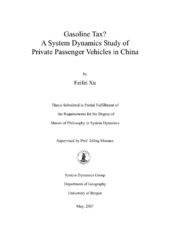Gasoline Tax? A System Dynamics Study of Private Passenger Vehicles in China
Master thesis
Permanent lenke
https://hdl.handle.net/1956/3277Utgivelsesdato
2007Metadata
Vis full innførselSamlinger
- Department of Geography [634]
Sammendrag
Scarcity of oil and increasing demand make the crude price continue to climb,and such pressure urges our effort to reduce the reliance on oil products. As a majorconsumer of oil synthetic fuels, the transportation sector needs to take a big step inenergy conservation. To inform policy makers of costs and benefits in the future ofdecisions made now, this paper develops a system dynamic model to explore the roleof gasoline taxation in the process of fuel economy technology development andadoption.The model focuses mostly on the interplay of gasoline price change, carconsumer choices and automakers technology investment decisions. It is built andsimulated in the context of China and its growing private passenger car market.Gasoline tax, tax refund, technology development subsidy are tested and compared.When the gasoline price increases, the sooner we impose the gasoline tax, thebetter. Even though we face a cost increase right after the tax imposition, we canenjoy a much lower cost later and cover the cost increase before. Taking the tax assubsidy for technology development of fuel economy, a much better benefit can beenjoyed.
Utgiver
The University of BergenOpphavsrett
The authorCopyright the author. All rights reserved
